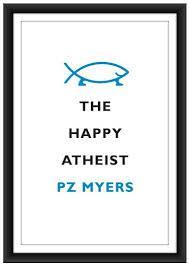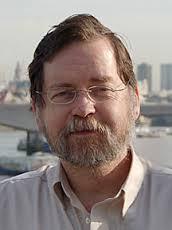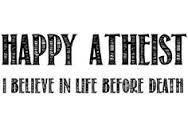 I’ve read the major atheist books – Harris, Dawkins, Hitchens – which might be called “combative.” Some feel the confrontational stance disserves the cause. I’m of two minds. True, telling believers “you’re idiots” is not helpful. But religious thought has been so powerful for so long (with such bad consequences) that assertive dissent seems well justified.
I’ve read the major atheist books – Harris, Dawkins, Hitchens – which might be called “combative.” Some feel the confrontational stance disserves the cause. I’m of two minds. True, telling believers “you’re idiots” is not helpful. But religious thought has been so powerful for so long (with such bad consequences) that assertive dissent seems well justified.
PZ Meyers (that’s how he spells his name), in The Happy Atheist, pulls no punches, laying on the scorn; but he does it in an easy, breezy, good humored manner.

For example, it’s clear that ideas of Heaven and Hell are rooted in fear of death and chafing at unfairness in life. Myers, however, digs down to dissect these beliefs, showing how incoherent they actually are. A Hell where people are tortured forever? Myers notes that souls have no bodies and hence no pain receptors. But even ignoring that, such sustained agony would soon disintegrate one’s psyche, and continuing to torture an insensate husk would be pointless. Maybe an omnipotent deity could get around that; but how does this sadism square with the idea of a loving and forgiving God?

Undoubtedly, ”Hell” is the creation of people full of bitterness toward other people; such a belief is an insult to God.
Myers similarly unpacks the idea of Heaven. The problem is that desires and dreams are what life is about. Fulfill them all, and where does that leave you? In “a kind of retirement home where everyone is waiting to die. Waiting forever.”

As Myers says, death is an end, that “deserves all the sorrow that the living bring to it, but the absurd attempts of believers to soften it with lies are a contemptible disservice to the life that is over.” Religion actually makes a mockery of death’s seriousness.
One chapter is headed, “What Dreadful Price Must We Pay to Be Atheists?” Of course Myers is being facetious; but apropos the book’s title, many religionists do think atheists must be miserable misfits with something awry in their heads, unable to accept God’s love and all the happiness it confers. But atheists reject religion for one simple reason: it isn’t true. Trying to make oneself believe lies is no recipe for contentment. If believers get happiness from their faith, it’s a false paradise (I’ll refrain from saying “fool’s paradise”). Freeing ourselves from falsehood, and looking life’s truth fearlessly in the eye, is a recipe for happiness. That’s why atheists aren’t the afflicted lost souls believers think they are.
In fact, I know people who were tormented by their religion, struggling to square all its circles, that no prodigies of ratiocination could ever achieve. Only when they were able to extricate themselves from that briar patch could they finally feel at peace with their existence.

